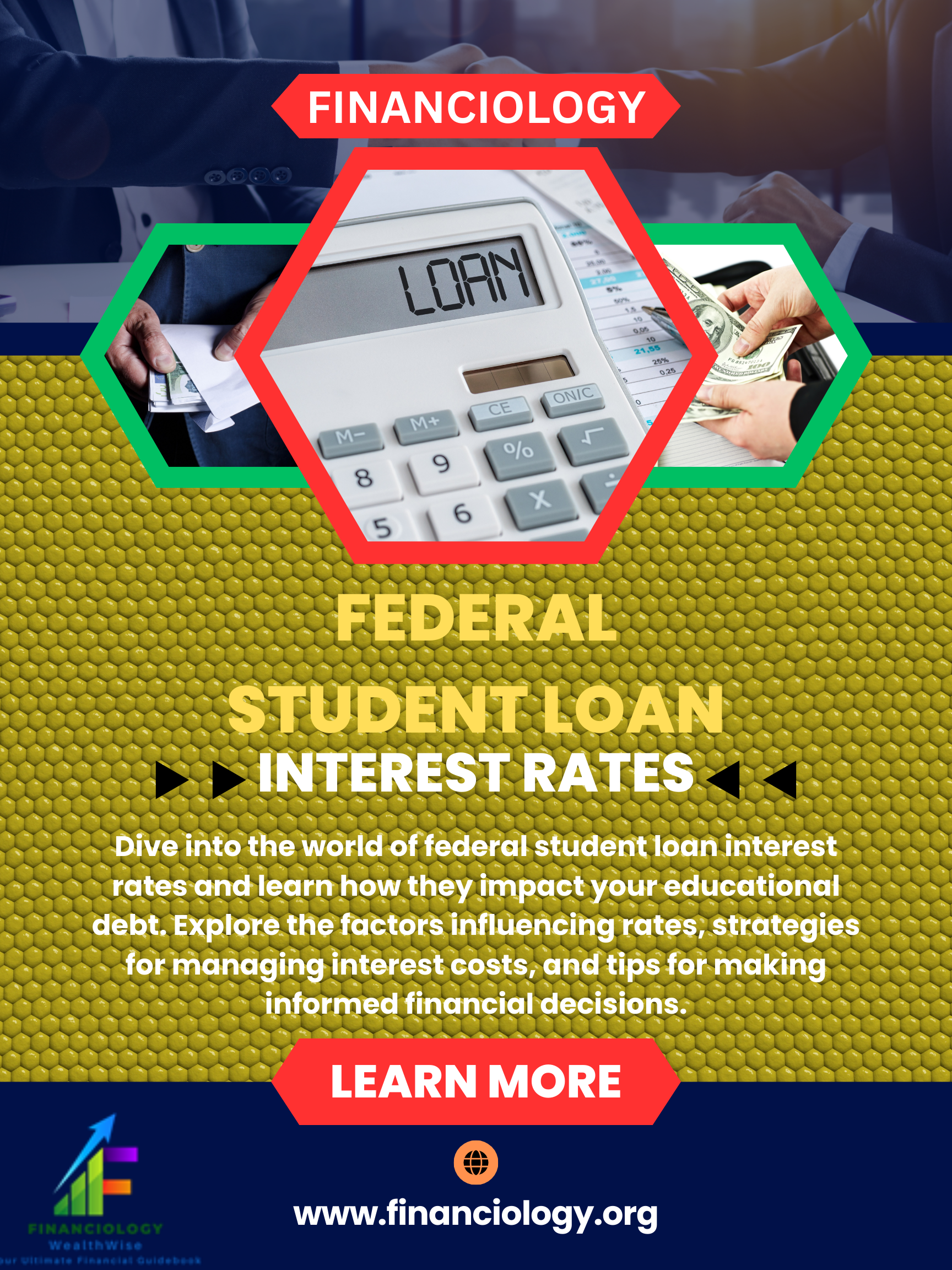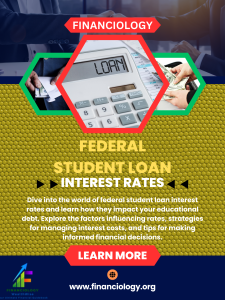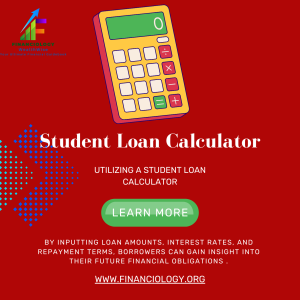Demystifying Federal Student Loan Interest Rates
7 min read
Navigating Federal Student Loan Interest Rates in 2024
What Borrowers Need to Know! Your Guide to Understanding and Managing Educational Debt:
Dive into the world of federal student loan interest rates and learn how they impact your educational debt. Explore the factors influencing rates, strategies for managing interest costs, and tips for making informed financial decisions.
Federal student loans serve as a cornerstone of financial aid for millions of students pursuing higher education. Understanding the nuances of federal student loan interest rates is crucial for borrowers to effectively manage their educational debt and plan for repayment.
Understanding Federal Student Loan Interest Rates
Federal student loan interest rates determine the cost of borrowing and impact the total amount repaid over the life of the loan. These rates are set by Congress and can vary depending on the type of federal loan, prevailing market conditions, and legislative changes.
Exploring Factors Influencing Rates
Several factors influence federal student loan interest rates, including:
- Loan Type: Different types of federal loans, such as Direct Subsidized Loans, Direct Unsubsidized Loans, and Direct PLUS Loans, may have varying interest rates.
- Market Conditions: Federal student loan interest rates are influenced by market trends, including changes in the economy, inflation rates, and government bond yields.
- Legislative Changes: Congress may enact legislation impacting federal student loan interest rates, such as setting fixed rates for new loans or implementing caps on interest rate increases.
Strategies for Managing Interest Costs
Borrowers can employ various strategies to manage federal student loan interest costs effectively:
- Choose the Right Repayment Plan: Selecting a repayment plan that aligns with financial goals and circumstances can help minimize interest costs. Options such as income-driven repayment plans may offer lower monthly payments and potential interest subsidies for eligible borrowers.
- Make Timely Payments: Making timely payments ensures that interest does not accrue unnecessarily and helps borrowers avoid additional fees or penalties.
- Consider Loan Consolidation or Refinancing: Consolidating multiple federal loans into a Direct Consolidation Loan or refinancing federal loans with a private lender may result in lower interest rates and simplified repayment terms.
Tips for Making Informed Decisions
When navigating federal student loan interest rates, borrowers should consider the following tips to make informed decisions:
- Stay Informed: Keep abreast of changes to federal student loan interest rates and relevant legislation that may impact borrowing and repayment.
- Compare Rates and Terms: Evaluate interest rates, repayment terms, and benefits offered by different federal loan programs to choose the most favorable option.
- Utilize Resources: Take advantage of resources provided by the U.S. Department of Education, financial aid offices, and reputable financial websites to access information and guidance on federal student loans.
Federal student loan interest rates play a significant role in shaping the cost of higher education and subsequent loan repayment. By understanding the factors influencing rates, employing strategies to manage interest costs, and making informed decisions, borrowers can navigate the complexities of federal student loans with confidence and ease.
Unlocking Student Loan Deferment

Understanding Qualifications and Benefits:
Discovering student loan deferment, qualifications, and benefits explained: Dive into the world of student loan deferment and learn about qualifications, benefits, and how to navigate financial challenges during deferment periods.
Student loan deferment serves as a valuable tool for borrowers facing financial hardship or significant life changes. Understanding the qualifications and benefits of deferment is essential for managing student loan obligations effectively and preserving financial stability.
Understanding Student Loan Deferment
Student loan deferment allows borrowers to temporarily postpone making payments on their federal student loans under specific circumstances. During deferment, interest may continue to accrue on certain types of loans, depending on the deferment type and loan terms.
Exploring Qualifications for Deferment
To qualify for student loan deferment, borrowers must meet specific eligibility criteria, including:
- Enrollment in a Qualifying Educational Program: Borrowers enrolled at least half-time in an eligible post-secondary institution or graduate fellowship program may qualify for deferment.
- Economic Hardship: Borrowers experiencing financial difficulties, such as unemployment, economic hardship, or serving in the Peace Corps, may be eligible for deferment.
- Military Service: Active duty military service members, National Guard members, or reservists called to active duty may qualify for deferment during their service period and up to 13 months following demobilization.
- Re-enrollment in School: Borrowers who re-enroll in school on at least a half-time basis after a period of non-enrollment may be eligible for deferment.
Exploring Benefits of Deferment
Student loan deferment offers several benefits to borrowers facing financial challenges:
- Temporary Relief: Deferment provides temporary relief from making student loan payments, allowing borrowers to focus on addressing immediate financial needs or pursuing educational opportunities.
- Preservation of Credit Score: By preventing delinquency or default, deferment helps borrowers maintain a positive credit history and avoid adverse effects on their credit score.
- Opportunity for Further Education: Deferment allows borrowers to pursue additional education or training without the immediate burden of student loan payments, potentially enhancing career prospects and earning potential.
Navigating Deferment Periods
During deferment periods, borrowers should consider the following strategies to maximize the benefits of deferment:
- Communication with Loan Servicer: Notify loan servicers promptly about eligibility for deferment and provide required documentation to ensure seamless processing.
- Understand Interest Accrual: Understand which types of loans accrue interest during deferment and consider making interest payments to prevent capitalization and increase loan balances.
- Explore Repayment Options: Use deferment periods to explore alternative repayment plans, such as income-driven repayment options, to manage student loan debt effectively post-deferment.
Student loan deferment offers a lifeline for borrowers facing financial hardship or significant life changes. By understanding qualifications, and benefits, and navigating deferment periods strategically, borrowers can leverage this tool to overcome financial challenges and maintain financial stability on their educational journey.
Understanding the Consequences of Student Loan Default

Exploring the Impact of Student Loan Default: Consequences and Strategies for Borrowers
A Guide for Borrowers: Delve into the world of student loan default and uncover its consequences. Learn about the financial, legal, and credit implications of defaulting on student loans, as well as strategies to avoid and address default.
Student loan default can have far-reaching consequences for borrowers, affecting their financial well-being, creditworthiness, and future opportunities. Understanding the repercussions of default is crucial for borrowers to take proactive steps to prevent default and mitigate its impact if faced with this situation.
Recent Posts:
- Discover Student Loan Forgiveness Programs in 2024
- Discover Ally High Yield Savings Account Benefits
- Explore the Best Student Loans in California
Understanding Student Loan Default
Student loan default occurs when a borrower fails to make payments on their student loans according to the terms of the loan agreement. For federal student loans, default typically occurs after 270 days of non-payment. Private student loans may have different default criteria outlined in the loan agreement.
Exploring Consequences of Default
The consequences of student loan default can be severe and may include:
- Damage to Credit Score: Defaulting on student loans can significantly damage a borrower’s credit score, making it challenging to obtain credit cards, loans, or mortgages in the future. A lower credit score can also result in higher interest rates and limited financial opportunities.
- Collection Actions: Lenders or loan servicers may initiate collection actions to recover the outstanding debt, including wage garnishment, tax refund offset, and legal action. These collection efforts can add additional fees and costs to the borrower’s debt burden.
- Loss of Financial Benefits: Borrowers in default may lose eligibility for federal financial aid programs, such as Pell Grants or federal student loans, making it difficult to finance future educational endeavors.
- Impact on Employment: Some employers conduct credit checks as part of the hiring process, and a history of student loan default may negatively impact employment prospects, especially in positions requiring financial responsibility or security clearances.
- Ineligibility for Loan Forgiveness or Repayment Plans: Borrowers in default may become ineligible for loan forgiveness programs or income-driven repayment plans, limiting options for managing their student loan debt.
Strategies to Avoid and Address Default
To avoid student loan default or address default if it occurs, borrowers can consider the following strategies:
- Communication with Lenders: Stay in communication with lenders or loan servicers to explore options for alternative repayment plans, deferment, or forbearance if experiencing financial hardship.
- Loan Rehabilitation: For federal student loans, loan rehabilitation programs allow borrowers to regain eligibility for benefits and remove the default status by making a series of voluntary, reasonable, and affordable payments.
- Seeking Legal Assistance: If facing legal action or collection efforts, consider seeking assistance from a qualified attorney or legal aid organization specializing in student loan issues to explore potential defenses or negotiate a resolution.
- Financial Counseling: Seek assistance from certified financial counselors or nonprofit organizations specializing in student loan counseling to develop a personalized plan for managing student loan debt and avoiding default.
In conclusion, student loan default carries significant consequences that can impact borrowers’ financial health and future opportunities. By understanding the repercussions of default and employing proactive strategies to prevent or address default, borrowers can take control of their financial situation and pave the way toward a brighter financial future.
Helpful Student Loans Online Links:
Citizen Bank: Undergraduate Student Loans: Click here
Discover Student Loans for College: Click here
We will learn in our next blog about student loan refinancing companies, student loan grace period extensions, and student loan forbearance requirements. Please give feedback about this blog if this is helpful or needs improvement, we’ll appreciate your valuable comments.






